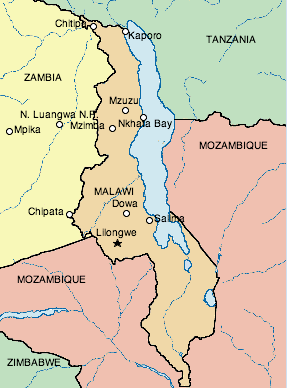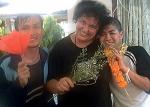Malawi Village Walk

Sun May 19th 2002 Village Walk
Africa does not really exist. Africa is a geographical name for a continent. Africa is made up of countries but people, especially in rural areas, don�t especially identify with the country they are in-most of which have artificial borders created during colonialism.
People do identify with their social groups. Each social group has its own language, distinct culture and system of beliefs and customs including all it�s taboos. The family is large and time spent communally together is highly valued-in fact it is how they survive. Families who have ancestors in common are called clans. At the head of the clan stands the chief who is chosen by a council of elders. Several clans together is what the western world calls a tribe and at it�s head stands the king. A �tribe� can number in the millions-bigger than many western countries. There is no such thing as Africa.
One morning the son of the Chief of the Tonga group (the use of the word tribe is not pc) from a nearby village takes us on a walk to his village for 100 Kwatcha each (about 25 cents). On the way down a dirt path we are taken to his house first. It is very small-about four rooms and we have to duck to go through the doors. The rooms are incredibly bare.
The Chief�s son whose name I didn�t write down, encouraged us to take pictures and showed us two large frames hanging on the walls with collaged pictures of tourists who had visited the village in the past. All he asked of us was to send him copies of the pictures we took of the villagers so he could hand them out. Then he showed us a typed letter hanging on the wall from a Canadian woman that had been sent several years ago. He gently took it down so we could read it…
Then we went into his bedroom that had one single bed with mosquito netting and absolutely nothing else. We didn�t ask where his wife slept; he introduced us to his children who were playing near the house but we were all scared to ask him about a wife because we were afraid there wasn�t one! I suspect there was a wife (or maybe more) but that she/they didn�t have enough status to be introduced to us. However we did meet his mother. There was a second little building with two rooms. Both were for cooking; wood was stacked near the walls and ashes from fires were still hot on the dirt floor.
While we were standing looking around we asked the Chief�s son some questions. How is your work divided among your family members…women do the easy work, he said patronizingly, �because it is simple� and men do the hard work. I looked at him to see if he was kidding. Then I asked him to give me an example of hard work and he answered that men build the house and work in the fields. He was not telling the truth about work in the fields though because in all the time we have been in these African countries we have seen only women working in the fields and we have seen a lot of men sitting. About this time the village brickmaker joins us-an obviously important man in the village. He explains that houses used to be made of mud and sticks but now they are made of cement floors, mud-baked brick walls covered over with mud and thatched roofs.
We move down the trail and are introduced to some extended family members while we take more pictures. As we walk the mile and a half past the homes to the center of the village children in tattered clothing come running out and grab ahold of our hands…as soon as Janine takes her hand away they latch onto it as soon as she puts it down again. Soon we have about 12 children walking-talking-laughing with us. We visit the elementary school-walls open to the outside, dirt floor and nothing else. A white volunteer from England is the teacher and has 90 students in one room.
I say to one of the older children that they must have to be very quiet during school. He said oh, yes, very quiet. I asked what happens if a student is not quiet. He says, oh, he is just asked to become quiet again. I gathered that this request carried a lot of power. From what I understood him to say, school is held in three shifts during the day so all the students have a chance to attend. Parents have to pay school fees so sometimes, he says, tourists will offer to help a family with the fees for the children.
The littlest, about 2, says he has to pee-pee. I repeat this to the Chief’s son and his reply was that “they all know where they are coming from” in other words he knows how to get home so he can pee.
Then we visit the hospital which amounts to a sort of two-room outpatient clinic. There are half a dozen beds in one very unsanitary room. He shows us a second room with a very crude delivery table that the nurses use, he says, to deliver babies. He says there is no doctor and if patients are very sick they are sent to another hospital in a nearby town. We were confused, however, because on the way back down the trail a man of about 30 in an acrylic athletic suit was in the yard looking after his young twins (this was a Sunday) and he introduced himself as the village doctor. Bob shook his hand, introduced himself and asked him some questions…the doctor had gone to medical school in Malawi and the weekdays were very very busy for him, he said. These two understand each other.
We walked past a tiny little grocery with a few items and buy some pop for the kids to share. The chief�s son directs the sharing much to our relief and the kids-anywhere from two to ten years old-are all very cooperative-which they probably wouldn’t have been if it had just been us handing it out. We pass a few tables with some vegetables like potatoes, yams, tomatoes, cassavas for sale. I buy a package of local tea and some biscuits (cookies).
Then we head back down the two-mile trail through corn and cassava fields to the camp. At the gate of the camp, children want to sell us bracelets made of telephone wire. We tell them they are going to screw up the phone lines but they just laugh knowing they have been caught at their trick. Older boys are selling carvings and other crafts items. One tells me he is licensed to do massage and only charges $7 an hour. I don�t think I will have a massage…
On the way back the chief’s son points out the nice big Chief’s house nearby…well, nice and big for Malawi anyway. His father is Chief of the whole Tonga tribe that covers quite a large area with two thousand people, he said. I ask him what are most of the Chief’s duties. He answers that the Chief is a “very very busy man because he has to help people when they have problems”-a one man judicial system-unless a crime has been committed in which case the police are alerted.
Tags: African Continent, Climbs & Walks, Culture, Excursions, Malawi


Leave a Reply